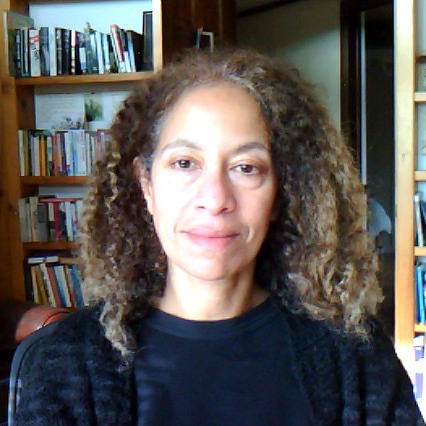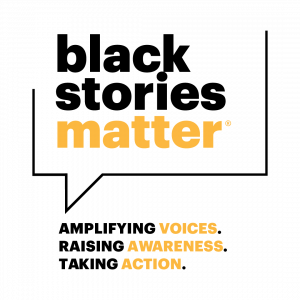By Dara Lurie
(Dara Lurie is a TMI Project workshop leader at the helm of Black Stories Matter along with Micah.)

I walk up to the reception desk at Albany Medical and say, “I have COVID.” I do not say, “I think I have COVID,” because at this point I am certain. I don’t need a test to tell me what’s going on.
Earlier that evening my heart rate spiked to 122, 138 then 148; my temperature shot up to 104. I don’t really think the ER can help me but I need a witness, other than my husband, Lee, to what’s happening to me. Maybe I’m hoping they will magically restore my weakened will to survive.
They send me to a quarantine room and the waiting begins. After the first hour, a deep chill sets in. This room with its refrigerated air feels like a slow death. I can feel my fever going back up. It takes two blankets for my body to stop shaking. I stand up and do my breathing exercises as I’ve been doing these past ten days.
*****
I had spent most of quarantine sheltering-in-place as suggested, but two weeks prior to my trip to Albany Medical, on the Sunday after George Floyd’s murder, I attended a Black Lives Matter Congregation in Poughkeepsie, NY. I was invited by the event organizers to facilitate one of the breakout circles that explored the question, “What would change for you if Black Lives Mattered?”
We created a wide spacious circle but were still not the recommended six feet apart. During my active facilitation, I removed my mask and put it back on when listening. Later that week, I attended a large rally across the Hudson River in Kingston, NY. Everyone wore masks but social distancing was impossible. On Saturday, driving through an unfamiliar part of Columbia County, I stopped and asked a woman for directions. She came ridiculously close to me and began speaking. I turned my face away but did not move away. I wish I had.
The following Sunday, I woke with a high fever and knew I was in trouble. I texted Isa Coffey, an herbalist, friend, and partner in a COVID wellness initiative we’d been working on together, to get resources into the black and brown communities in and around Hudson and Kingston areas. I wasn’t anticipating being a recipient of these services. Isa responded immediately, meeting Lee with a kit containing important elements such as a thermometer, an oximeter to measure the levels of oxygen in my blood, and herbal tinctures to support my breathing and heart health.
I had no idea, no precedent in my life, for the frightening journey I was about to embark on, through the strange terrain of a COVID infection. Unlike many of the illnesses we are accustomed to, COVID does not progress in a linear fashion. One day the temperature and oxygen levels are good and you believe you are getting better. The next day there are strange pains pulsing through your body and your fever goes up while the oxygen in your body declines. Because COVID has the ability to access 90% of our cells, it is a highly flexible entity – one that can evade our frontline attempts to put it down. Before this day when my will to survive seemed to be slipping through my fingers, I thought I had been improving.
*****
Now, in this frigid hospital room, I breathe and raise my arms, just as I learned to do in Aunt Peggy’s ballet class when I was four and five, opening the space in my chest, releasing the oxygen I no longer need. Hold and open. Hold and open. Hold and open a little more, until something releases, places in my lungs that were starting to close down, go to sleep, gradually numbing off into death. My breath says, “NO! Wake up. I won’t have this!”
By the third and fourth hours of waiting, I’m exhausted and then desperate. They won’t give me any Tylenol for my rising fever. Fortunately, I’ve brought my own water.
I wait five hours to finally be admitted into the inner sanctum of the hospital where a nurse administers an IV to hydrate me. I lie on an examining table plugged into a large monitor that I’m unaware of until it suddenly begins beeping. I turn to see the red display showing my oxygen levels dropping to 86 then 79, far below the acceptable level of 95. I watch my heart rate spike again. Lee tells me to calm down and I breathe willing myself into calm. The numbers stabilize and the beeping stops.
Waiting and more waiting. Giving me nothing but time to reflect on this illness and the place where I most likely contracted it. I can’t stop thinking about the glaringly obvious metaphor — it was in a space of Black folks gathering, yet again, to reaffirm that Black Lives Do Matter, where we were repeating the words of Eric Garner and George Floyd, “I can’t breathe,” where I began to have trouble drawing breath.
I tally the ways in which white supremacy, a set of cultural and legal controls gradually put in place over the course of this country’s history, reminds me of the COVID infection, which is now the most pressing threat to my well-being.
COVID and white supremacy are both stealthy and cruel diseases. COVID doesn’t just mess with your respiratory system; it attacks your heart, brain, and other organs. White supremacy enters our bodies carrying a diseased set of subconscious beliefs and unless you are acutely aware of what you are truly feeling and thinking, you will never notice its presence as it silently infiltrates your heart and mind.
COVID is new to me but I’ve been long aware that I carry the disease of white supremacy in my body. I know because I have been paying close attention. So many liberal and progressive white people bristle at the idea they might be racist. They say, “I don’t have a racist bone in my body,” or “I’m the least racist person in the world.” For so many years, I too lacked the language and concepts to help me understand what I was experiencing but that did not inoculate me from the disease.
Many years ago, walking up the street in my old Upper West Side neighborhood I passed two teenage Black girls from the projects. For some reason, on this particular day, I caught a soundtrack that had probably played out unnoticed hundreds of times in the past. I heard myself thinking, “These girls in their big earrings, tight jeans, popping gum as they talk, are going to grow up to be baby-mothers on welfare and never make anything of their lives.” I was horrified by the level of racism and self-betrayal implicit in this judgment. I was disgusted with what I heard myself thinking but there it was; my own unadorned racism and I had to deal with it.
It’s taken me years to understand the mechanics of how I became so alienated from my own identity. There are so many stories along this path and I see how they stretch all the way back to my Jamaican great-grandparents, and grandparents passed on to me by my American-born mother.
I see the long path of those first ancestors emerging from the slave ship into a new world fraught with new rules and signifiers that needed to be grasped, and quickly because survival depended on it.
My great-grandmother, Isabel Turner, was an acknowledged daughter of an Irish plantation owner and his ‘mulatto mistress’. This was an important marker. I can see how, already from the slave ships of the late 18th century to the mid-1900s, my family line was progressing steadily along a path that would erase as much of its African origins as possible. I see myself at a crossroads on this path, in the late 20th century, when, as my aunt once said, “If you were to have children with a white man, those children would be seen as white.”
*****
Eight hours of waiting in these freezing hospital rooms and I finally have to stand up. I can’t deal with being prone and plugged in any longer. I work my way around the IV tube and monitor line attached to my finger and stand by the examining table. The nurse comes in.
“I want to go home,” I say.
“I’m so sorry,” the nurse says as she detaches the IV drip. “I can’t do anything.”
Outside, in another room a man, large by the sound of his voice, is bellowing, “I’m in pain! I’m in pain!” He sounds angry. I’ve tried to stay away from anger because it drains my energy and sets my heart rate into an uneasy pattern. Despite my best efforts, I have felt the roiling in my blood, my own impulse to shout, “I’m in pain. I’m furious. Fuck this shit.”
I have been carrying this impulse for most of my life — sometimes venting it, but mostly suppressing it — understanding that an angry Black woman is perceived as a threat. I understood the price of the white privilege extended to me was my silence, or at best, a voice muted in academic tones of reason when speaking about my experience. It meant never shouting, “I’m in pain!”
Now, I feel a wave of petulant anger emerging. I want others, the doctors and nurses to feel my discomfort. One part of my brain understands they are working hard but another part says, “Fuck it. I’ve been here for 8 hours and need to go home. I need you to care about me!”
I recognize my voice of white privilege; a voice formed early from the belief that the world should/would/must care about me. I have moved through my life alternately expecting and demanding that the world care about me. Unlike so many Black people in this country, I have not lived a life where my daily survival is a question. Until contracting COVID, and having to turn my entire focus to survival, I have not known a life where, “I can’t breathe,” is my truth. It has been a frightening and strange new reality for me.
I have been fortunate. People, society, and circumstance have extended much grace to me throughout my life. I felt that grace walking out of the ER, 12 hours after checking in, at six in the morning, with Lee by my side, steadfast and loving. As we walked down the hospital ramp to find our car, I felt we were walking away from the scene of a battle. Gazing at the sunrise, I felt gratitude knowing that I would have a chance to heal.
*****
It is impossible for me to imagine the lives of Black people who have lived with the daily struggle to breathe easy whether because of daily microaggressions or outright violence experienced in white spaces, systemic oppression, harsh working conditions, fear, anxiety, high blood pressure, PTSD and so many conditions common to the Black experience in this country. I cannot imagine these lives but I now have a real corollary: like the disproportionate number of other Black people experiencing COVID, I understand what it means to struggle to breathe, to feel my entire body overtaken by an invisible force that desires only to crush my will.
COVID. White supremacy. They both attack the hearts, minds and bodies of all whom they enter.
On the day that my fever spiked to 104, Isa said to me “I truly believe that this virus carries fear into the body.” A little while later, as I immersed myself in the soothing bath she recommended, I felt the essence of my fear emerge from behind the heat and confusion of my fever. I understood what my body had been feeling. The presence of an invasive intelligence that, having gained entry, was now attempting to rewrite the very language in which my body functioned.
As I named this fear to myself, I felt a burst of coherence, a simple determination that would carry me through the next 12 hrs in the ER and beyond to the following days where my body would begin the slow process of healing.
There is great power in the naming of a thing. In myth, fairytales, and fantasy these words, incantations or codes hold the key to truths that have been intentionally hidden, truths that are needed for the survival of a people, sometimes their very planet.
We are at the convergence of many crossroads now, a place where magic words need to be spoken by each one of us. We must be willing to listen with deep honesty to the words we’ve been speaking to ourselves all along and acknowledge the fears and judgments we hold against ourselves and others. We must be willing to stand, as I did many years ago on the Upper West Side, in astonishment and shame, and resolve to do better. And, we must learn to care for ourselves in the process because, like COVID, white supremacy is a shape-shifting disease that has worked its way into the deepest recesses of our beings.
Each one of us must become willing to name our hidden words and move forward with intention and with gratitude for this opportunity to heal.

Want More Black Stories Matter Content?
Stories have the power to increase visibility, raise awareness, change people’s hearts and minds, and inspire people to take meaningful action. We are making every effort to ensure all of our Black Stories Matter content is easily accessible, widely consumed, and is accompanied by tools to deepen the impact.
Listen: The TMI Project Story Hour, Season Two: Black Stories Matter, launches this fall. Learn more and subscribe to our podcast HERE
Host: a Black Stories Matter viewing party and discussion from anywhere in the world. Click HERE to learn more and sign up.
Share: TMI Project’s mission with Black Stories Matter is to elevate the underrepresented stories of the Black experience in America – the full spectrum – the triumphs, humor, beauty, and resilience. Click HERE to submit your story to be featured on the TMI Project blog.

6 Comments
Thank you Dara for your story. I do believe we are at a cross roads and I only hope we can learn to take the right path this time.
I am glad that you are healing I hope we can all heal.
Thank you
Dana
This was so enlightening. I am a white woman who has long told myself that I refuse to be racist. That’s the beginning of my conversation because any public denial is meaningless until I challenge myself. My granddaughter is biracial. It hurt me, watching her grow up and seeing her treated differently than her brothers and sister. When she offered a kindness to a four year old white boy, he turned on her saying, I don’t need help from a n——. I could tell from her expression and shock that she didn’t feel anger, she felt shame. I felt sadness. I still feel it.
Thank you for this insightful piece, mentor Dara. For me, it is one more needed lesson in my slow progress toward being fully awake about myself, the demons of my racist upbringing, my white privilege that was unconscious for so many years. Please keep on the mend, dear, we need you.
Thank you for this. I hope you are healing. Your writing has moved me. I have felt that fear in my life. I’m 71, white and priveliged. Thank you!
I love all that you have shared and feel fortunate to have read. I admire all that share their stories on TMI so brave and I truly believe hearing these stories and hearing the perspectives are so important and more people need to hear these stories so we can grow and do better, Thank you- I love your last words “Each one of us must become willing to name our hidden words and move forward with intention and with gratitude for this opportunity to heal”. Thank you
Thank you, Dara for this powerful piece. Hoping you recover fully and that the challenge to systemic racism brings about change and healing.